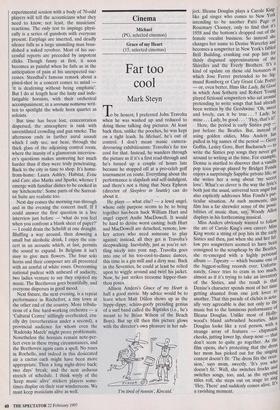Cinema
Michael (PG, selected cinemas) Grace of my Heart (15, selected cinemas)
Far too cool
Mark Steyn
Tbe honest, I preferred John Travolta when he was washed up and reduced to doing those talking dog pictures. At least back then, unlike the pooches, he was kept on a tight leash. In Michael, he's out of control. I don't mean manic camera- devouring exhibitionism: Travolta's far too cool for that. Instead, he wanders through the picture as if it's a first read-through and he's turned up a couple of hours late because he stopped off at a pro-celeb golf tournament en route. Everything about the performance is slapdash and self-indulgent, and there's not a thing that Nora Ephron (director of Sleepless in Seattle) can do about it.
He plays — what else? — a lewd angel, whose only purpose seems to be to bring together has-been hack William Hurt and angel expert Andie MacDowell. It would be hard to devise worst casting: both Hurt and MacDowell are detached, remote, low- key actors who need someone to play against; instead, all they get is Travolta's sleepwalking. Inevitably, just as you're set- tling nicely into your nap, Travolta goes into one of his too-cool-to-dance dances, this time in a gin mill and a dirty mac. Back in the Seventies, he could at least be relied upon to wiggle around and twirl his jacket. Now, he just strikes tiresome hipper-than- thou poses.
Allison Anders's Grace of my Heart is half a good movie. My advice would be to leave when Matt Dillon shows up as the hippy-dippy, schizo-goofy presiding genius of a surf band called the Riptides (i.e., he's meant to be Brian Wilson of the Beach Boys). But up till then this picture glows with the director's own pleasure in her sub- `I'm tired of runnin, Kincaid.' jest. Illeana Douglas plays a Carole King- like gal singer who comes to New York intending to be another Patti Page or Rosemary Clooney, only to find that it's 1958 and the bottom's dropped out of the female vocalist business. So instead she changes her name to Denise Waverley and becomes a songwriter in New York's fabled Brill Building, cranking out pop hits for thinly disguised approximations of the Shirelles and the Everly Brothers. It's .a kind of update on those old biotuners 111 which Jose Ferrer pretended to be Sig- mund Romberg or Cary Grant Cole Porter or, even better, films like Lady, Be Good in which Ann Sothern and Robert YOU played fictional songwriters who sat around pretending to write songs that had already been written by the Gershwins: `Oh, sweet and lovely, can it be true ... ? Lady, be, mine Lady, be good .. . "Hey, that's it!
Here, the period is early Sixties pop — just before the Beatles. But, instead of using golden oldies, Miss Anders has pulled in big names of the period — Gerry Goffin, Lesley Gore, Burt Bacharach W write the Sixties pop songs they never got around to writing at the time. For example, Denise is startled to discover that a vanilla pop teen pin-up played by Bridget Fonda enjoys a surprisingly Sapphic private life, so she writes her a song about 'my secret love'. What's so clever is the way the lyric s both just the usual, universal teen angst but also explicitly addresses Miss Fonda's par- ticular situation. At such moments, this film has a far shrewder sense of the possi- bilities of music than, say, Woody Allen displays in his forthcoming musical. Miss Anders obviously wanted to follow the arc of Carole King's own career: Miss King wrote a string of pop hits in the early Sixties and then, just when she and her fel- low pro songwriters seemed to have been consigned to the scrapheap by the Beatles, she re-emerged with a highly personal album — Tapestry — which became one of the biggest-selling records ever. Unfortu- nately, Grace tries to cram in too much, almost as if it's trying to take an inventory of the Sixties, and the result is that Denise's character spends most of her time getting shunted from one jerk lover W another. That this parade of clichés is actu- ally very agreeable is due not only to the music but to the luminous performance of Illeana Douglas. Unlike most of Holly- wood's bland airbrushed beauties, Miss Douglas looks like a real person, with a strange array of features — chipmunk cheeks, jutting lower lip, sharp nose — that don't seem to quite go together. As the film opens, she's protesting that the dress her mom has picked out for the singing contest doesn't fit: The dress fits the occa- sion,' says mom, sweetly. 'It's you doesn't fit.' Well, she switches frocks an switches songs, too, and, as the opening titles roll, she steps out on stage to sing `Hey, There' and suddenly comes alive. It s a ravishing moment.


























































 Previous page
Previous page